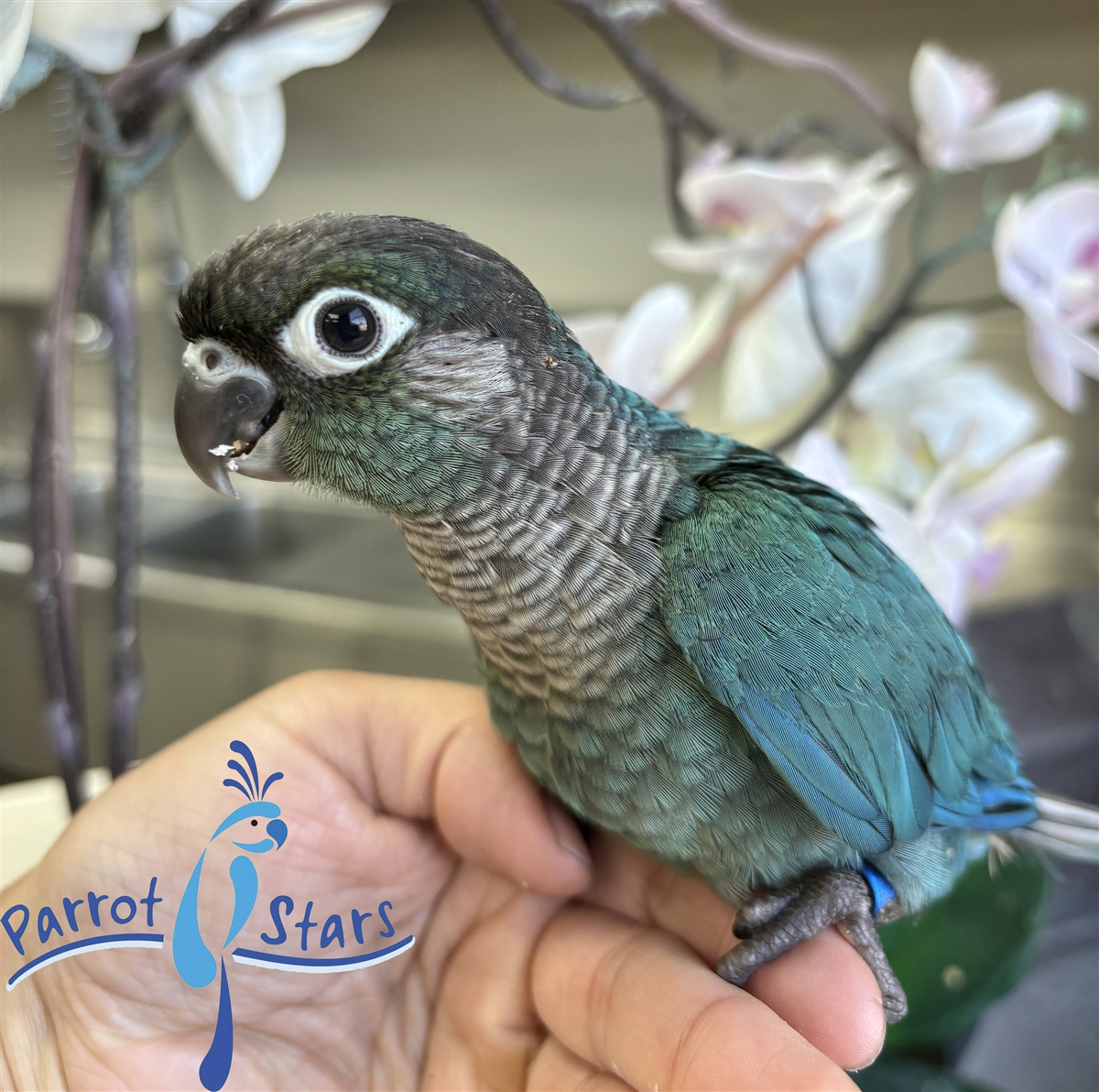Green-cheeked conures are delightful, vibrant, and friendly parrots that can make wonderful companions. If you’re considering adopting one, it’s important to understand their needs and what makes them such appealing pets. This guide will take you through everything you need to know about adopting and caring for a green-cheeked conure.
Key Takeaways
- Green-cheeked conures are social, affectionate, and thrive on interaction, making them excellent pets for attentive owners.
- These birds can mimic sounds and some words, adding a playful element to their personality.
- The cost of adopting a green-cheeked conure ranges from $120 to $600, with ongoing monthly expenses for care.
- Adoption is a rewarding option, often less expensive than purchasing from breeders, and helps provide homes for birds in need.
- Daily care includes a nutritious diet, regular exercise, and social interaction to keep your conure healthy and happy.
Green-Cheeked Conure: A Wonderful Pet Companion
Green-cheeked conures are small, colorful parrots known for their playful nature and charming personalities. Their vibrant green plumage, accented by shades of blue, red, and yellow, makes them visually striking. Beyond their appearance, these birds are known for their intelligence and ability to form strong bonds with their owners.
One of the most endearing qualities of green-cheeked conures is their affectionate nature. They enjoy spending time with their human companions and can become quite attached. If you’re looking for a pet that will greet you with enthusiasm and enjoy being part of your daily life, a green-cheeked conure might be the perfect choice.

“Baby Green Cheek Conure For Sale” from www.parrotstars.com and used with no modifications.
Social Nature and Affection
Green-cheeked conures are highly social creatures that thrive on interaction. They are happiest when they are part of the family activities and enjoy being included in daily routines. This social nature means they require a significant amount of attention and engagement from their owners. If left alone for extended periods, they can become bored and potentially develop behavioral issues.
To keep your conure happy, consider setting aside time each day for interaction. This can include playing games, teaching them tricks, or simply having them perch on your shoulder as you go about your activities. The more time you spend with them, the stronger your bond will become. For more insights on why these birds make great companions, check out why a Green-Cheeked Conure makes the perfect pet parrot.
Ability to Mimic Sounds and Words
While green-cheeked conures are not the most prolific talkers in the parrot world, they can learn to mimic sounds and a few words. This ability adds a fun dimension to their personality and can be quite entertaining. Training them to mimic requires patience and consistency, but it can be a rewarding experience for both you and your bird.
Start by repeating simple words or sounds regularly. Use a positive tone and offer treats as a reward when they attempt to mimic you. Over time, with encouragement and practice, your conure may surprise you with their growing vocabulary.
Suitability for Families and Individuals
Green-cheeked conures are versatile pets that can adapt well to different living situations. They are suitable for both families and individuals, provided they receive enough attention and care. Families with children should ensure that interactions are supervised, as conures can be nippy if handled roughly. For those considering bringing a new pet into their home, here’s a helpful home preparation guide to ensure a smooth transition.
For individuals, especially those who spend a lot of time at home, a green-cheeked conure can offer companionship and joy. Their playful antics and affectionate nature make them excellent pets for those who can dedicate time to their care. Learn more about the health benefits of adopting a pet.
Cost of Green-Cheeked Conure Adoption
Adopting a green-cheeked conure involves both initial and ongoing costs. Understanding these expenses will help you plan and ensure you can provide the best care for your new pet. For insights on the benefits of adopting a pet, you can explore the physical and mental health benefits associated with pet adoption.
Price Range for Adoption and Purchase
The cost of adopting a green-cheeked conure can vary widely. If you choose to adopt from a shelter or rescue organization, you might expect to pay between $120 and $250. Purchasing from a breeder can be more expensive, ranging from $300 to $600 or more, depending on the bird’s age, color, and lineage, so rescuing not only saves a life but money too. Adoption is often a more economical choice and provides a home for birds in need. It’s a rewarding experience that not only saves money but also helps support animal welfare.
Daily Care Requirements
Taking care of a green-cheeked conure involves more than just feeding and cleaning its cage. These birds require daily interaction and mental stimulation to stay healthy and happy. Start by ensuring their cage is cleaned regularly. A clean cage helps prevent diseases and keeps your conure comfortable. Use a 3% bleach solution to disinfect the cage, but make sure to rinse it thoroughly to avoid any harmful residues.
Besides cleanliness, you should also focus on providing a safe environment. This means checking for any potential hazards within the cage, such as sharp edges or small parts that could be ingested. Safety is paramount, as these curious birds will explore everything in their surroundings.
Diet and Nutrition Essentials
A balanced diet is crucial for the health of your green-cheeked conure. Their diet should include a mix of seeds, pellets, fresh fruits, and vegetables. Pellets should form the base of their diet, as they provide essential nutrients. Seeds can be offered in moderation as a treat, but they should not be the mainstay of their diet. For more tips on caring for birds, you can explore the dos and don’ts of fostering pets.
Fresh fruits and vegetables are vital for providing vitamins and minerals. Offer a variety of options such as apples, carrots, and leafy greens. Always wash fruits and vegetables thoroughly to remove any pesticides. Additionally, avoid feeding your conure avocado, chocolate, and caffeine, as these are toxic to birds.
Exercise and Socialization Needs
Green-cheeked conures are active birds that need plenty of exercise to stay fit. Ensure they have enough space to move around within their cage and provide opportunities for them to fly outside the cage under supervision. Aim for at least two to four hours of supervised out-of-cage time each day.
Socialization is equally important. These birds thrive on interaction with their human companions. Engage them with toys, teach them new tricks, or simply spend time talking to them. Regular socialization helps prevent boredom and associated behavioral issues. To learn more about the benefits of adopting a pet, check out the physical and mental health benefits.
Green-Cheeked Conure Behavior and Interaction
Understanding the behavior of your green-cheeked conure will help you build a strong bond and ensure a harmonious relationship. These birds are known for their playful and curious nature. They enjoy exploring their environment and interacting with their owners.
Most importantly, they have a natural inclination to form close bonds. This means they can become quite attached to their human companions, often preferring their company over other birds. As a result, they may become territorial or jealous if they feel neglected. To learn more about their behavior and care, you can visit The Spruce Pets.
Importance of Bonding
Bonding with your green-cheeked conure is essential for a healthy and happy relationship. Spend time each day interacting with your bird, whether through play, training, or simple companionship. This consistent interaction helps build trust and strengthens your bond.
Because they are so social, these birds may develop anxiety or behavioral problems if they feel ignored. Therefore, make bonding a priority. Use positive reinforcement during interactions to encourage good behavior and create a positive association with your presence.
Handling and Physical Interaction Preferences
Green-cheeked conures generally enjoy being handled, but it’s important to approach them with care. Start by offering your hand slowly and allowing them to step up onto your fingers. Avoid sudden movements, as these can startle them. For more insights on fostering birds and other pets, check out this guide.
Once your conure is comfortable with handling, you can begin incorporating gentle petting and scratching. Pay attention to their body language; if they seem tense or uncomfortable, give them space. Respect their boundaries to maintain a trusting relationship.
Example: “When I first brought home my green-cheeked conure, I spent time each day letting him perch on my shoulder while I read. This quiet bonding time helped him feel secure and built trust between us.”
Training your conure to accept handling can take time, but patience and consistency are key. Use treats and praise to reward positive interactions, making the experience enjoyable for your bird.
Training Tips for Your Conure
Training your green-cheeked conure can be a fun and rewarding experience. Start with basic commands like “step up” and “step down.” Use a calm voice and offer treats as rewards when they successfully follow commands.
As your conure becomes more comfortable with basic commands, you can introduce more complex tricks. Consistency is crucial; practice regularly but keep sessions short to maintain their interest. Remember, patience and positive reinforcement are your best tools.
Adopt or Rescue a Green-Cheeked Conure
Choosing to adopt or rescue a green-cheeked conure can be a fulfilling decision that provides a loving home to a bird in need. Adoption is often less expensive than purchasing from a breeder and supports the welfare of animals.
Example: “Adopting my green-cheeked conure from a rescue was one of the best decisions I’ve made. Not only did I provide a home for a bird in need, but I also gained a wonderful companion who brings joy to my life every day.”
Before adopting, research local shelters and rescue organizations that specialize in birds. Visit these facilities to meet potential conures and find one that matches your personality and lifestyle.
Consider the bird’s background and any special needs it might have. Some rescued birds may require additional patience and training to adjust to their new environment. However, the reward of providing a loving home to a bird in need is well worth the effort.
Benefits of Adoption and Rescue
Adopting or rescuing a green-cheeked conure comes with numerous benefits. Firstly, it is often more affordable than buying from a breeder. Secondly, it provides a home to a bird that might otherwise be without one.
Additionally, adopting from a rescue often means you receive a bird that has been health-checked and assessed for behavioral issues, giving you peace of mind about your new companion’s health and temperament. For more information, you can explore this guide on the benefits of adopting a pet.
Where to Find Rescues Orgs and Adoption Centers
Finding a rescue organization or adoption center for green-cheeked conures is easier than you might think. Start by searching online for bird-specific rescues in your area. Websites like The Spruce Pets can help you locate available birds in shelters near you. Additionally, social media groups dedicated to bird lovers often share information about birds in need of homes.
When visiting a rescue or adoption center, take the time to ask questions about the birds’ history and health. This information will help you make an informed decision and ensure you’re ready to meet the bird’s needs. For additional tips, check out this rescue pet home preparation guide.
Choosing the Right Bird for Your Home
Choosing the right green-cheeked conure involves considering both the bird’s personality and your lifestyle. Spend time observing the birds available for adoption. Look for one that seems curious and responsive to your presence. A bird that shows interest in you is more likely to bond quickly. For more insights, explore the pet adoption journey from shelter to sofa.
Consider your living situation and how much time you can dedicate to your new pet. Green-cheeked conures thrive in environments where they receive ample attention and interaction. Ensure you have the time and resources to meet these needs before making your decision.
Final Thoughts on Green-Cheeked Conure Ownership
Owning a green-cheeked conure can be a rewarding experience filled with joy and companionship. These birds offer more than just a beautiful addition to your home; they become part of your family. Understanding their needs and providing a loving environment will ensure a happy, healthy life for your conure.
Fostering a Lifelong Companion
When you bring a green-cheeked conure into your home, you’re making a commitment to a lifelong companion. These birds can live up to 30 years with proper care. It’s essential to consider this long-term commitment and be prepared to adapt your lifestyle to accommodate your new pet.
Building a strong bond with your conure involves time, patience, and consistency. The effort you put into nurturing this relationship will be rewarded with a loyal and affectionate friend.
The Joys and Challenges of Ownership
Owning a green-cheeked conure is not without its challenges. These birds require daily interaction, a balanced diet, and a safe environment to thrive. Behavioral issues can arise if their needs are not met, so it’s crucial to stay engaged and attentive.
However, the joys of owning a conure far outweigh the challenges. Their playful antics, ability to mimic sounds, and loving nature make them a delight to have around. With the right care and attention, your green-cheeked conure will become a cherished member of your family.
Frequently Asked Questions
As you consider adopting a green-cheeked conure, you might have some questions. Here are answers to common inquiries about these delightful birds.
Are Green-Cheeked Conures Good for Beginners?
Yes, green-cheeked conures can be a great choice for beginner bird owners. They are relatively easy to care for and have a friendly disposition. Their social nature makes them excellent companions for those willing to invest time in their care.
Beginners should be prepared to learn about proper diet, cage maintenance, and training techniques to ensure their conure thrives. Support from experienced bird owners or joining bird clubs can provide valuable guidance.
Overall, with dedication and a willingness to learn, green-cheeked conures can make an excellent first pet bird.
How Much Attention Do They Require Daily?
Green-cheeked conures require a significant amount of daily attention. Aim to spend at least two to four hours interacting with your bird each day. This interaction can include playtime, training sessions, or simply having your conure with you as you go about your activities.
Regular social interaction is crucial to prevent boredom and behavioral issues. Consider rotating toys and introducing new activities to keep your conure engaged and mentally stimulated.
What Makes Conures Different From Other Parrots?
Conures, including green-cheeked conures, are known for their playful and affectionate nature. They are smaller than many other parrot species, making them more manageable for first-time bird owners. Their vibrant colors and charming personalities make them stand out among parrots. For more information, check out this guide on green-cheeked conures.
Unlike some larger parrots, conures are generally quieter, though they can still be vocal. Their ability to mimic sounds adds an entertaining element to their behavior. Additionally, conures form strong bonds with their owners, often preferring human companionship over other birds.
These unique traits make green-cheeked conures a popular choice for those looking for a lively and loving pet bird.


